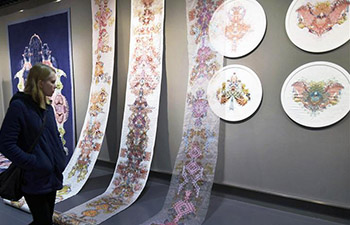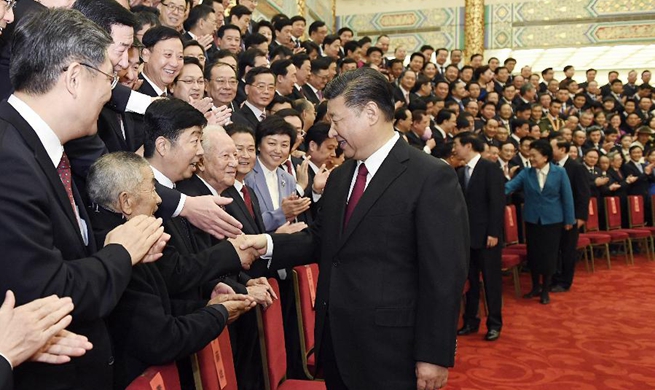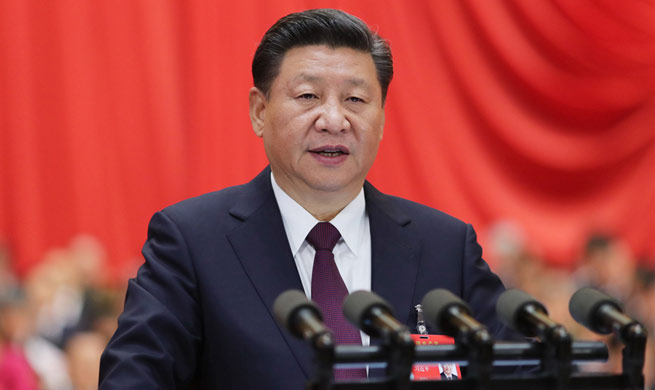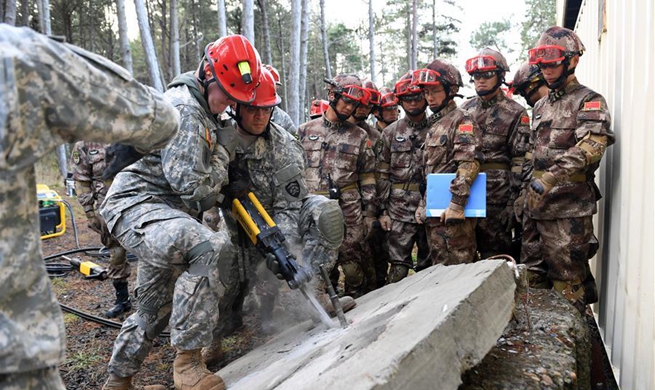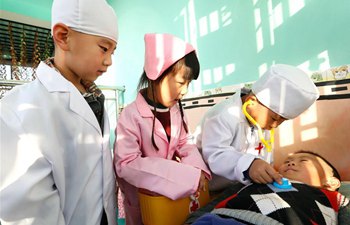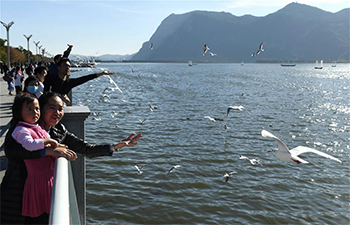by Jamal Hashim
BAGHDAD, Nov. 19 (Xinhua) -- Long years of bloody violence, displacement, social division and political crises have imposed significant physical and emotional impacts on children of Iraq.
However, the defeat of Islamic State (IS) group from their last urban stronghold in Iraq, gives the Iraqi vulnerable children a great deal of hope that finally the light has glittered at the end of the dark tunnel.
Deprivation and horrendous images of devastation and torn bodies that scattered in the streets, and the scenes of killing their family members, relatives and friends will remain I the memories of dozens of thousands of Iraqi children, according to Mohammed al-Timimi, professor of sociology in Mustansriyah University in Baghdad.
"The danger of such images is that they left negative psychological and emotional impacts on the children and has increased their vulnerability," Timimi told Xinhua.
"They may keep the pattern of violence and hatred going on their future behaviors as they enter adulthood," Timimi said.
The advance of IS extremist group in Ramadi, the capital of Iraq's western province of Anbar, has pushed the 9-year-old Maher, and his mother Saja, 36, to beg at markets and outside mosques in Baghdad western neighborhood of Khadraa.
She left and her family their home in the IS-held city of Fallujah after the IS militants seized the city in 2014, after her husband was killed in the violence about two years ago. She and her three children fled to Khadraa and lived in a room at an under-construction building.
Their home now is only one room, but fairly clean, with a broken window covered by a piece of cardboard, and poorly furnished with old torn carpet and three single sponge beds and a closet on the edges of the room. Her kitchen is outside the room with only small cooker stove and an old cupboard.
"This is all what we got, although it is not enough with freezing weather in winter in the coming days," She said. "With the help of people around, my children and I can find some worm and enough clothes to wear."
Saja's husband, who was a teacher of primary school in Fallujah, was killed in early 2015 by a mortar barrage during the clashes between the Iraqi army and IS militants who seized the city.
"Before his (her husband) death, we used to have our own house and I wanted my sons to go school to be educated and to get happy life," she said with tears filling her eyes.
"I had to leave. Life was impossible in Fallujah under IS militants. My husband was killed and women have no right to work. My children and I needed protection, while most of my relatives were facing the same o different hurdles," she said.
Despite nearly 17 months have passed since the Iraqi forces liberated the city if Fallujah, Saja could not return after she realized that here house was destroyed and life is difficult there as the city's economy and infrastructure is still reviving gradually.
Her elder son, Maher, is hoping to convince his mother to let him go for work as a construction worker instead of going to school like many of his peers to help his mother and his younger brothers.
According to Timimi, the cycle of violence, displacement and poverty forced many Iraqi families to push their children to abandon their schools and seek jobs that mostly not suitable for their physical, mental and health capabilities.
"Under such circumstances, the children are suffering malnutrition and diseases like anemia and skin diseases of various kinds, as well as psychological difficulties," Timimi said.
Timimi, who visited Ramadi and Fallujah last month, said that the cities of Anbar province are still badly damaged and predicted long time for the schools to fully restore, despite the enthusiasm of the teachers and children.
"Many of the boys and girls who returned to Anbar cities are back to learning, many after some two years of absence. When we asked them, they still want to become doctors, engineers, teachers and other things. They are thirsty for rich and meaningful lives," Timimi said.
The UN's Office for the Coordination of Humanitarian Affairs (OCHA) said in its latest report on November 11, that 5.3 million Iraqis displaced since June 2014, over 2.2 million have returned to their liberated cities, towns and villages.
In many cities and towns, most of the returnees are living in their habitual residence, but others had to live with relatives or in rented houses, or are temporarily living in public or unfinished buildings, waiting for their habitation to be repaired, according to the report.
During the long years of bloody conflict in Iraq, most of the militias, including the IS group, have long been using children and young adults to carry out attacks.
Najib al-Jubouri, a political analyst, told Xinhua that there have been reports about children being recruited by extremist militant groups, sometimes for money or under the veil of so-called sacred holy martyrdom.
"They are making use of their poverty, or using their ignorance and fanaticism that were widely spread among some Iraqi communities," said Jubouri.
Najih Ibrahim, an activist of children's rights, told Xinhua that during his visit to the refugee camps in Baghdad and the provinces of Salahudin, Nineveh and Anbar, the government relief actions toward the vulnerable children in too weak.
"There is an urgent need for psychological rehabilitation because most of the children have witnessed brutality and violent scenes during the presence of IS militants back in their homes and the current harsh circumstances in the refugee camps," Ibrahim said.
"Many of the children in the camps received different wounds, some are crippled, by the bombs and IS sniper shots either in their cities or while they fled their homes when the Iraqi forces liberate their cities," he said.
"There is still needs for some basics like enough drinking water, medical care and the sort of the food that they receive in the camps," Ibrahim added.
As the Iraqi forces have fully liberated last urban stronghold in Iraq and almost the full defeat of the terrorist IS group is looming, the hopes to ease the suffering of the Iraqi children is increasing.
"The Iraqi government with the help of the international community must put forward plans to rebuild the infrastructures of the devastated cities," Ibrahim said.
"The end of armed conflict against IS group and the disappearance of other militias is substantial in reviving welfare of Iraqis. These are essential conditions to bring families back to normal life, as educational order and social stability are substantial to achieving progress in children's protection," Ibrahim concluded.







